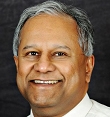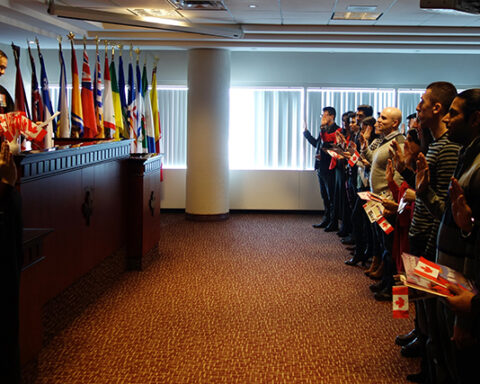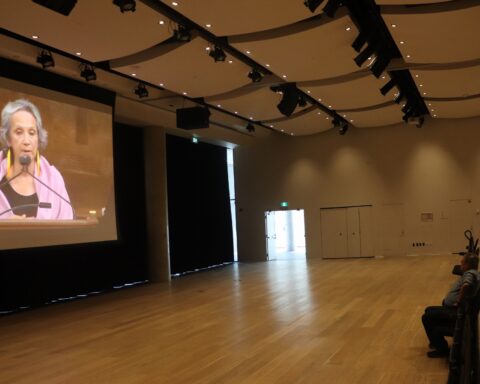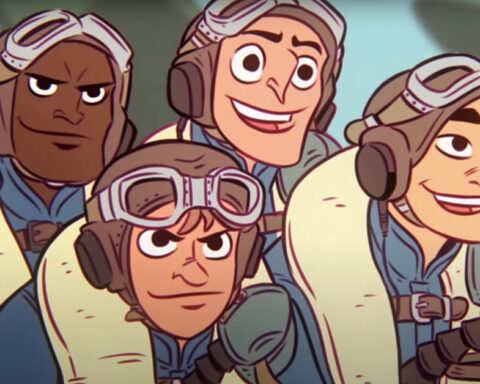This being the season of remembrances, a community dialogue was launched in Toronto to promote broader public respect for the human rights of Indigenous peoples and peoples of colour in Canada.
“We need to do a lot of remembering about the injustices inflicted on one of the founding peoples of Canada now that we are slowly but surely coming to know about the other history,” said Marie Wilson, one of the commissioners of the Truth and Reconciliation Commission (TRC) of Canada.
“It is time to remember the more than 4,000 aboriginal children who never returned to their homes after being sent to residential schools by the Canadian government,” said Ms. Wilson reminding us of the infamous history of Indian Residential Schools and the impact it had on First Nation communities.
She said this part of our collective history was not “taught in our schools, was not part of the [test] criteria for citizenship for new Canadians, was not part of the Welcome to Canada package.”
Ms. Wilson said the TRC’s requests to the government on providing input for the welcome package was rejected, “but we haven’t let up on that.”
“Perhaps if the pressure comes from the new Canadian community itself, it will have a different outcome,” she said urging newcomers not to be indifferent to the travails of the First Nations. “We cannot cherry pick the history we inherit. We need to invest in our collective understanding and put a halt to… our mass ignorance and change the way we look at each other, talk to each other and talk about each other,” Ms. Wilson said.
Unequal relationship
“Every single aboriginal person in Canada has been impacted by the ill-effects of the residential school system,” said Justice Murray Sinclair, the Chief Commissioner of the TRC and the keynote speaker. “It was an attempt to erase their way of life and indoctrinate them with a new culture. To do away with Indians as Indians.”
Justice Sinclair said the Canadian government’s attempts to build a relationship of equals with First Nations were unjust as it comes after years of creating an unequal relationship.
“Far too many Canadians – including many peoples of colour and First Peoples, are unaware of the Canadian history of colonization of the Indigenous peoples and the exclusion of communities of colour,” said Avvy Go of the Colour of Poverty/Colour of Change, one of the lead organizers of the event. “It is our hope that today’s dialogue will foster positive relationships among First Peoples and peoples of colour as we support each others’ struggles for justice,” said Ms. Go.
Barbara Hall, Chief Commissioner of the Ontario Human Rights Commission said her organization was pleased to be part of this initiative. “The TRC is a small body with a big mandate and we all have a role in its efforts at reconciliation,” said Ms. Hall.
“We are all Treaty people, and we share a collective responsibility to help bring about justice and equality for all. Reconciliation for indigenous peoples and peoples of colour is an important first step towards that goal,” said Debbie Douglas, Executive Director of Ontario Council of Agencies Serving Immigrants (OCASI).
A statement of Commitment to Truth, Justice and Reconciliation was presented at the event and all participants were asked to sign the document which calls for, among other things:
- The use of the United Nations Declaration on the Rights of Indigenous Peoples as the framework for working towards ongoing reconciliation between Indigenous and non-Indigenous peoples;
- Reparations for historical wrongs that have yet to be acknowledged and/or redressed by the governments in Canada; and
- The extension of the mandate of the TRC.
The event was co-organized by OCASI, OHRC and the Metro Toronto Chinese & Southeast Asian Legal Clinic. Sponsored by Osgoode Hall Law School of York University, it also marked the 250th anniversary of the Royal Proclamation of 1763 that acknowledged the rights of the aboriginal people and the 25th anniversary of the Canadian Multiculturalism Act.
Earlier in the day, the City of Toronto proclaimed November 12, 2013 to November 12, 2014 the Year of Truth and Reconciliation in Toronto to acknowledge aboriginal peoples affected by the Residential School System. – New Canadian Media
Ranjit is a Toronto-based writer with interest in Canadian civic affairs, immigration, the environment and motoring. Maytree and Al Jazzera English alumnus.





